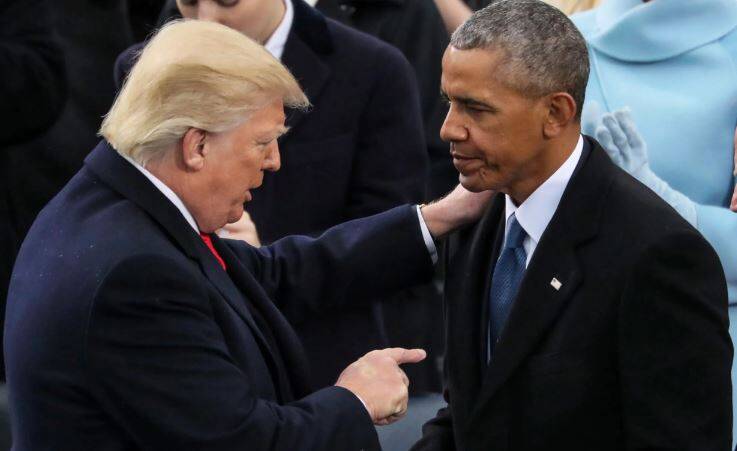
In the vibrant, often tumultuous, landscape of global politics, it’s not uncommon for leaders to engage in spirited debate. What is becoming increasingly alarming, however, is the descent into what can only be described as a baseless and dangerous political theater, epitomized by recent exchanges between former U.S. President Barack Obama's office and current President Donald Trump.
On Tuesday, the political temperature in Washington, D.C., spiked dramatically. President Trump, in a move that has become a hallmark of his presidency, hurled accusations of "treason" and election rigging against his predecessor, Barack Obama. The response from Obama's office was swift and, notably, rare. Spokesperson Patrick Rodenbush cut through the usual diplomatic silence, stating, "Out of respect for the office of the presidency, our office does not normally dignify the constant nonsense and misinformation flowing out of this White House with a response. But these claims are outrageous enough to merit one. These bizarre allegations are ridiculous and a weak attempt at distraction."
This isn't just another political spat; it’s a symptom of a deeper malaise in democratic discourse. When a sitting president, asked about a grave matter like the convicted sex offender Jeffrey Epstein, pivots instead to unsubstantiated claims of "criminality" by a former president, it speaks volumes about the priorities and tactics at play. Trump's assertion to reporters that Obama is "guilty" of "treason" and that "they tried to steal the election" isn't merely provocative; it actively undermines faith in democratic institutions and the electoral process itself.
The purported basis for these extraordinary claims stems from recent suggestions by Director of National Intelligence Tulsi Gabbard and CIA Director John Ratcliffe, who allege that Obama administration officials manipulated intelligence to sabotage Trump's 2016 victory. Gabbard has even announced a "criminal referral" to the Justice Department. On the surface, this might appear to be a pursuit of justice. Yet, a closer look reveals a troubling pattern of selective interpretation and outright disregard for established facts.
Rodenbush rightly points out, in the statement from Obama's office, that nothing in the recently cited documents contradicts the widely accepted conclusion that Russia actively sought to influence the 2016 election, even if votes weren't directly manipulated. This finding was not a partisan invention but affirmed by a bipartisan Senate Intelligence Committee report in 2020, led by a Republican, Senator Marco Rubio. This is not some deep state conspiracy; it is a consensus derived from rigorous investigation.
The argument that a December 2016 intelligence assessment, which allegedly stated Russia "did not impact recent U.S. election results" by cyberattacks, was "abruptly pulled" is misleading. While it's true the Obama administration never claimed that cyberattacks directly altered vote counts, as Obama himself stated at the time, they consistently highlighted Russia's extensive interference through disinformation campaigns, hacked documents, and the use of troll farms. The subsequent Special Counsel Robert Mueller's investigation and later Senate reports unequivocally backed these findings.
Perhaps most damning for the current administration's narrative is the outcome of the John Durham report. This investigation, championed by Trump himself and appointed by then-Attorney General Bill Barr, spent over three years probing claims of politicization in the Russia-related investigations. Its findings, while critical of the FBI's handling in some areas, fell far short of substantiating the "criminality" or "treason" now being alleged. To accuse a former president of such grave offenses without credible, independent evidence is not leadership; it is recklessness.
From our vantage point in Kenya, observing these political machinations in a leading global democracy offers a potent lesson. The relentless pursuit of "old grievances," particularly when conveniently timed to deflect from current controversies – such as the backlash concerning the handling of the Epstein case – risks eroding the very foundations of trust in government and media. When elected officials prioritize inflammatory rhetoric and conspiracy theories over factual accountability, the public pays the price.
Democratic lawmakers have sharply criticized the administration's actions, viewing them as an attempt to rewrite history. Senator Mark Warner, D-Va., succinctly articulated the concern: "This is just another example of the DNI trying to cook the books, rewrite history, and erode trust in the intelligence agencies she’s supposed to be leading." House Democratic Caucus Chair Pete Aguilar of California echoed this sentiment, calling it "all a distraction" from other issues.
Ultimately, this ongoing saga underscores the critical importance of a discerning public and a vigilant media. In an era saturated with information, distinguishing between genuine inquiry and calculated misinformation has never been more vital. For the health of any democracy, the echo chamber of accusations must give way to a commitment to truth, transparency, and respectful, evidence-based debate. Anything less is a disservice to the office of the presidency and to the citizens it serves.


Add comment
Comments